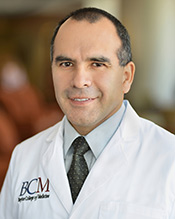 Texas Children’s collaborative work to develop a novel device to anchor the chorio-amniotic membranes during fetal surgery was recently funded by the Eunice Kennedy Shriver National Institute Of Child Health & Human Development (NICHD) of the National Institutes of Health (NIH).
Texas Children’s collaborative work to develop a novel device to anchor the chorio-amniotic membranes during fetal surgery was recently funded by the Eunice Kennedy Shriver National Institute Of Child Health & Human Development (NICHD) of the National Institutes of Health (NIH).
Partnering with Baylor College of Medicine, the Department of Bioengineering at Texas A&M University, and local life sciences commercialization firm Fannin Innovation Studio, the $225,000 Small Business Innovation Research (SBIR) grant will be used to advance the development of a device that can be introduced into the uterine cavity under ultrasound guidance to anchor the chorio-amniotic membranes, thereby reducing the risk for premature rupture of membranes (PROM) during fetal surgery.
Preterm PROM is the most frequent complication associated with fetal surgery and can increase the risk of premature delivery that could potentially add the insult or prematurity to the fetal anomaly that leads to the need for fetal surgery.
Through the Texas A&M undergraduate and graduate design program, a group of Texas A&M engineering students collaborated with Dr. Jimmy Espinoza and OB/Gyn-in-Chief Dr. Michael A. Belfort, obstetricians and gynecologists, and fetal surgeons at Texas Children’s and Baylor, to create the device in 2016. Espinoza and Belfort challenged the students to develop innovative tools that could be percutaneously introduced into the uterus during fetal surgery to anchor the chorio-amniotic membranes in order to reduce the risk of preterm PROM.
Fetal surgery is a relatively new discipline that aims to reduce the risk for fetal death in conditions such as twin-to-twin transfusion syndrome, severe fetal anemia, congenital diaphragmatic hernia or fetal hydrops, or reduce the long term complications and improve the quality of life in conditions such as spina bifida. Texas Children’s and Baylor are at the forefront on fetal surgery in the U.S. and have innovated techniques to make fetal surgery safer for the mothers and their unborn children.
After extensively collaborating with Texas Children’s surgeons to understand the challenges of anchoring the chorio-amniotic membranes during fetal surgery and the need for refinement, the collaborative team developed a device that can be percutaneously introduced into the uterine cavity under ultrasound guidance in order to anchor the chorio-amniotic membranes to reduce the risk for preterm PROM. This new innovation in fetal surgery could potentially be used in all fetal surgeries because of its percutaneous approach and should reduce the risk for the most common complication associated with fetal surgery, namely pre-term PROM.
“The development of new devices and new approaches in fetal surgery is very important to make fetal interventions safer not only for the fetus but also for the mother,” said Espinoza, co-director of the Fetal Center at Texas Children’s. “The decision to proceed to fetal surgery is very altruistic for the mothers because they will be exposed to risks associated with surgery for the benefit of their unborn child. Thus, we have the obligation to minimize those risks. This award recognizes the academic partnerships that are necessary to advance the frontiers of fetal surgery.”
The team’s invention has won the top prize at Texas A&M University’s 2016 annual Engineering Design Showcase. The project was judged against over 700 students on more than 150 other projects.

